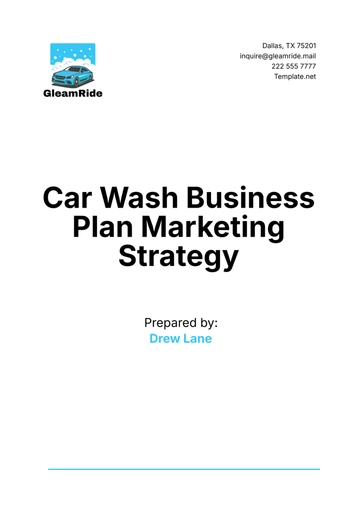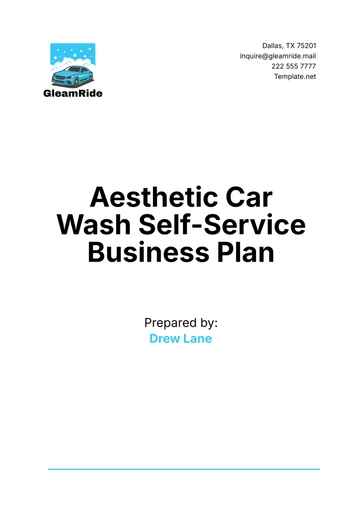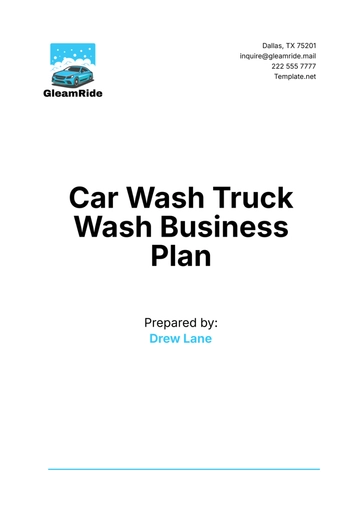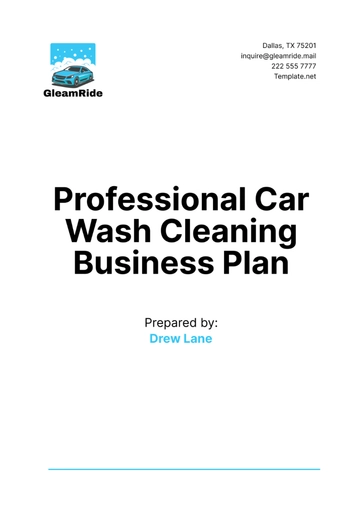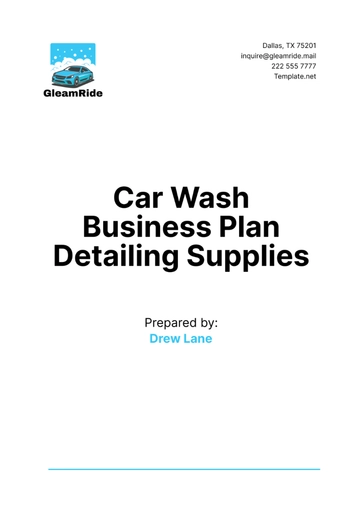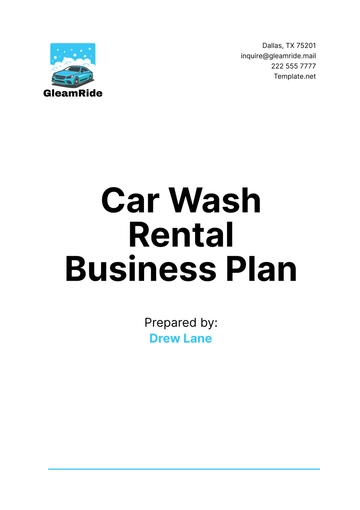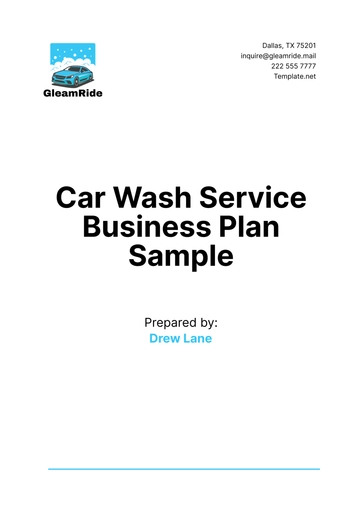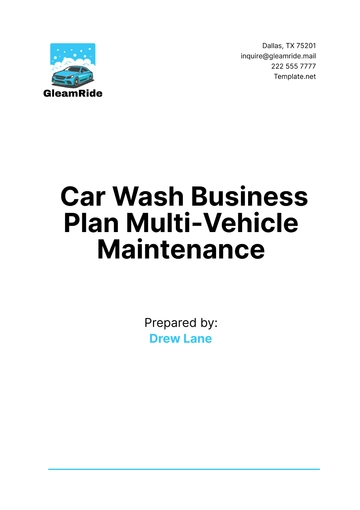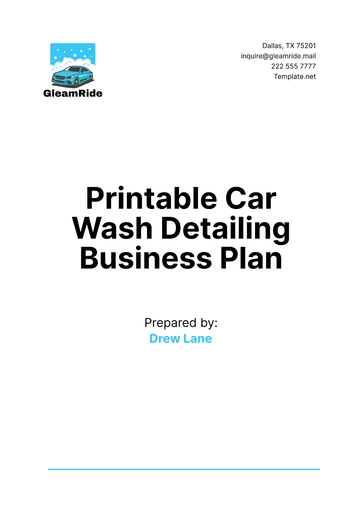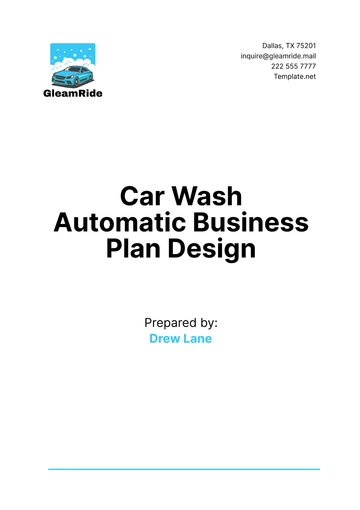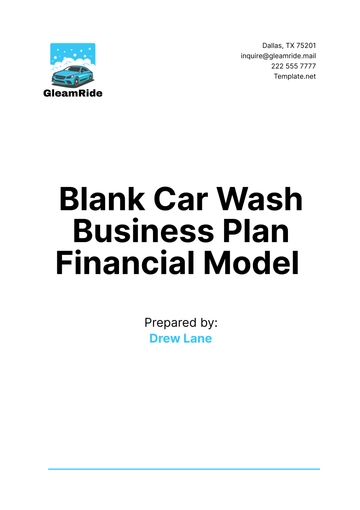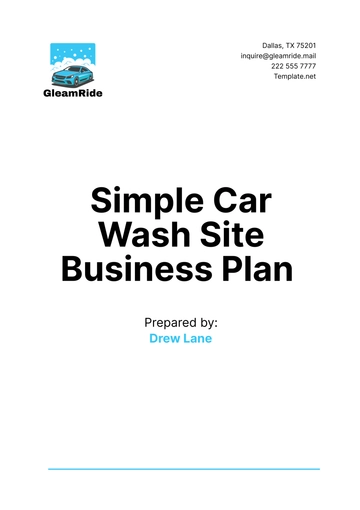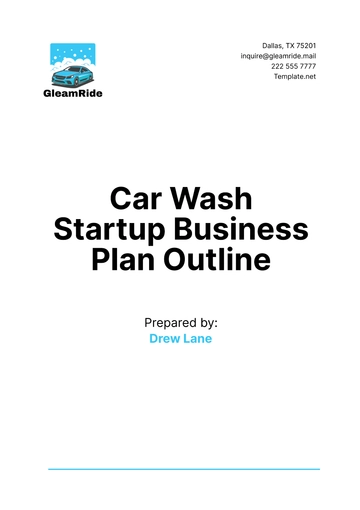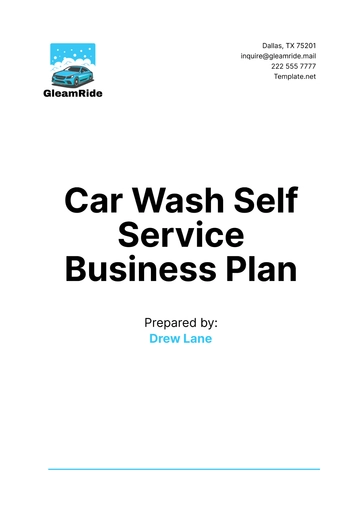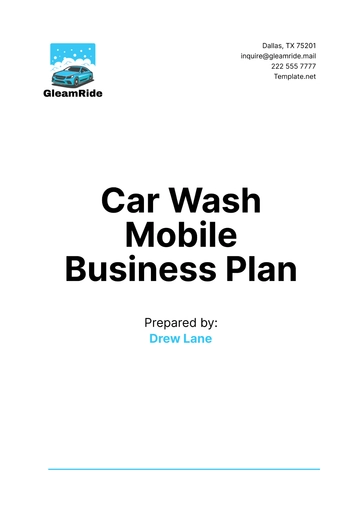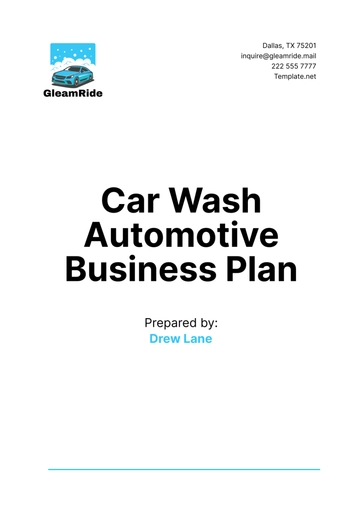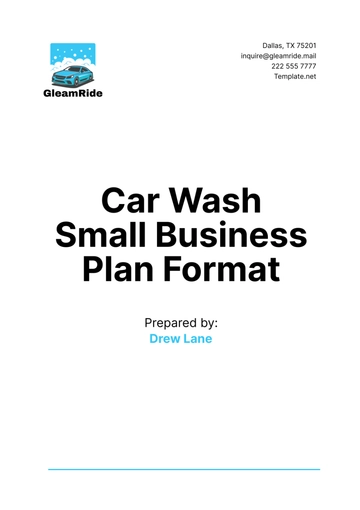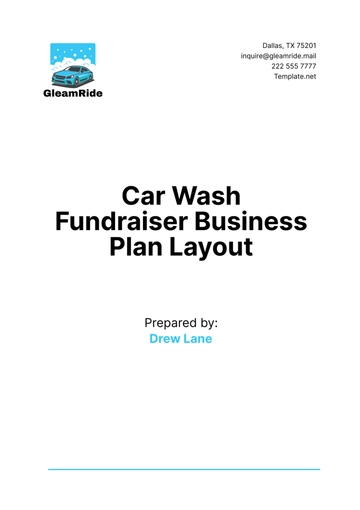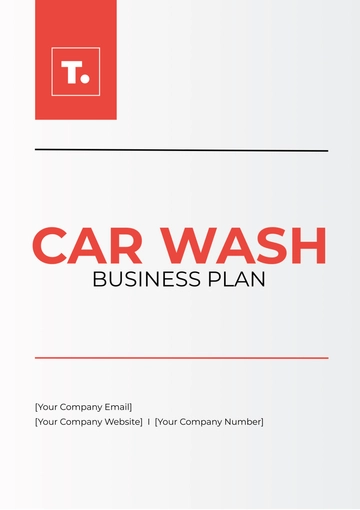Free Car Wash Fundraiser Business Plan Layout
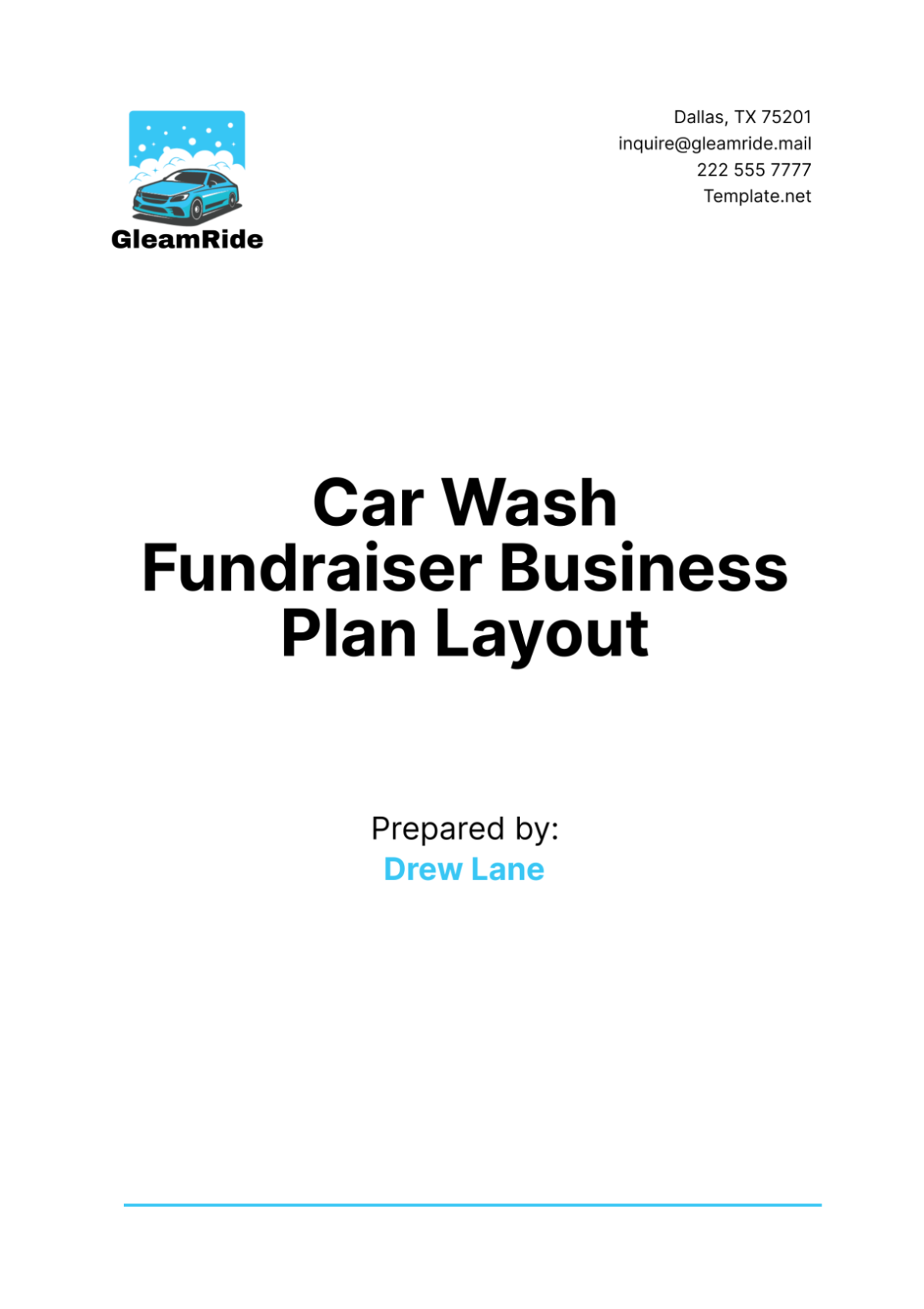
I. Executive Summary
A. Overview of the Car Wash Fundraiser Concept
[Your Company Name] aims to organize a community-driven car wash fundraiser to raise funds for the homeless community. This event will not only generate financial support but also foster community engagement and raise awareness about our cause. Our approach combines effective marketing strategies, volunteer engagement, and high-quality service to ensure a successful and impactful fundraiser.
B. Mission Statement
The mission of [Your Company Name] is to raise funds for the homeless through a well-executed and community-involved car wash fundraiser. We strive to provide exceptional service while creating a positive impact on our community by promoting cleanliness and environmental consciousness.
C. Objectives of the Fundraiser
Financial Goals: To raise $[Amount] through donations and car wash services.
Community Engagement: Engage 100 community members as volunteers and participants.
Awareness: Increase awareness about homelessness by reaching 100 of households through promotional activities.
II. Business Description
A. Introduction to the Fundraiser
[Your Company Name] proposes to host a car wash fundraiser as a means to support the homeless community. This event will be structured to appeal to both the community's desire to support charitable causes and their need for convenient car cleaning services. By leveraging our organizational strengths and community relationships, we aim to create a memorable event that drives both financial support and community engagement.
B. Type of Car Wash Service Offered
During the fundraiser, a variety of car wash services will be available to participants. These services will cover basic exterior washes, ensuring the outer surface of the vehicles is thoroughly cleaned. Additionally, there will be options for interior cleaning, providing a comprehensive tidy-up of the vehicle's inside spaces such as vacuuming, dusting, and upholstery cleaning. For those looking for more comprehensive care, premium packages will be offered, incorporating advanced services like waxing, which helps protect the vehicle’s paint, and detailed cleaning, ensuring every nook and cranny of the vehicle is spotless. This range of service options will be made available allowing them to select from different levels of service according to their needs and preferences. This flexibility is designed to appeal to a broad spectrum of car owners, regardless of their specific requirements or budgets.
C. Target Audience
Our primary target audience includes local residents, businesses, and organizations interested in supporting community initiatives. Additionally, we will target car owners who value convenience and quality service. By strategically positioning our fundraiser in high-traffic areas and leveraging local media and social channels, we aim to maximize participation and donations.
D. Unique Selling Proposition (USP)
[Your Company Name] stands out by offering not just a car wash but an opportunity to contribute to a meaningful cause. Our event promises professionalism, efficiency, and a commitment to environmental sustainability through the use of eco-friendly cleaning products. Moreover, our strong community ties and volunteer engagement ensure a welcoming and supportive atmosphere that encourages participation and donation.
III. Market Analysis
A. Industry Overview
The car wash industry in [State/County] is robust, with steady demand driven by the local climate and car ownership rates. Traditional car wash services are abundant but lack the charitable focus that [Your Company Name]'s fundraiser offers. This gap presents an opportunity to differentiate ourselves while tapping into a market already accustomed to car maintenance services.
B. Target Market Analysis
Our primary target market includes:
Local residents are seeking convenient and affordable car wash services.
Businesses and organizations interested in supporting local causes through corporate social responsibility initiatives.
Environmental enthusiasts who value eco-friendly practices.
C. Competitor Analysis
Competitors include traditional car wash businesses and other fundraising initiatives in the community. While traditional car washes offer convenience, they often lack the community-driven focus and charitable appeal that our fundraiser embodies. Other fundraising methods such as bake sales or charity auctions may engage different demographics but lack the universal appeal and tangible service benefit of a car wash.
IV. Fundraiser Strategy
A. Fundraising Goals and Targets
Our primary financial goal is to raise $[Amount] through donations and service sales during the event. Secondary goals include engaging at least 100 volunteers and achieving a minimum participation rate of 5 cars washed.
B. Fundraiser Timeline
Preparation Phase: Includes securing permits, recruiting volunteers, securing sponsorships, and promoting the event through local media and social channels.
Execution Phase: The main event day(s) where car wash services are provided, donations are collected, and community engagement activities take place.
Follow-up Phase: Involves thanking participants, reporting fundraising results, and gathering feedback for future improvement.
C. Promotion and Marketing Strategy
To maximize visibility and participation, [Your Company Name] will employ a multi-faceted marketing approach:
Social Media Campaigns: Utilizing Facebook, Instagram, and Twitter to promote event details, engage with the community, and share progress updates.
Local Partnerships: Collaborating with local businesses for cross-promotion and sponsorships.
Traditional Advertising: Placing ads in local newspapers, distributing flyers, and leveraging community bulletin boards.
D. Partnership Opportunities
Collaborating with local businesses and organizations can enhance our event's reach and impact:
Sponsorship Packages: Offering tiered sponsorship opportunities in exchange for promotional benefits such as logo placement, event naming rights, and media coverage.
Community Partnerships: Engaging local schools, churches, and nonprofits to participate as volunteers, promote the event, or host ancillary activities during the fundraiser.
V. Operations Plan
A. Location Selection
The fundraiser is scheduled to take place at a venue that is centrally located and offers ample parking facilities. Additionally, the chosen venue will be highly visible to passing traffic, ensuring maximum exposure. Some of the potential locations under consideration for this event include school parking lots, community centers, or the parking spaces provided by partnering businesses.
B. Equipment and Supplies Needed
Essential equipment includes high-pressure washers, eco-friendly cleaning products, drying towels, and waste disposal bins. Supplies such as signage, donation collection boxes, and promotional materials will also be prepared.
C. Staffing Requirements
Volunteers will be recruited and trained to perform various roles:
Car Wash Crew: Responsible for washing and detailing vehicles.
Customer Service: Greeting participants, collecting donations, and managing customer inquiries.
Logistics Team: Ensuring smooth traffic flow, managing equipment setup, and waste disposal.
D. Health and Safety Considerations
Safety protocols will be established to ensure a safe environment for volunteers and participants:
Airborne Disease Precautions: Following local health guidelines regarding mask-wearing, social distancing, and sanitation practices.
Vehicle Safety: Implementing procedures to safeguard vehicles during the washing process and managing traffic flow to prevent accidents.
VI. Financial Plan
A. Budget for the Fundraiser
The budget will encompass expenses such as equipment rental, supplies purchase, promotional materials, permits, and volunteer incentives. A detailed spreadsheet outlining projected costs and income will be maintained to track financial performance.
B. Pricing Strategy
Service pricing will be competitive yet reflective of the charitable nature of the event:
Basic Wash: $[Amount]
Premium Package: $[Amount]
Additional Services (e.g., waxing): $[Amount]
Donations will also be encouraged through cash contributions and sponsorships, with suggested donation amounts prominently displayed.
C. Fundraising Projection
Based on market analysis and fundraising goals, we anticipate washing approximately 100 cars and generating $[Amount] in revenue. Donations from sponsors and participants are projected to contribute an additional $[Amount] towards our fundraising target.
D. Contingency Plan
Contingency funds will be set aside to cover unforeseen expenses such as inclement weather, equipment malfunction, or additional promotional needs. A buffer of [Percentage] of the total budget will ensure financial resilience throughout the event.
VII. Implementation Timeline
A. Pre-event Planning Phase
Timeline | Details |
|---|---|
Month 1 | Secure necessary permits and permissions |
Finalize venue selection and contract negotiation | |
Recruit volunteers through community outreach | |
Confirm sponsorship agreements and benefits | |
Month 2 | Develop and print promotional materials |
Launch social media campaigns and online promotions | |
Distribute flyers and posters in high-traffic areas | |
Conduct volunteer training sessions | |
Month 3 | Finalize logistical plans for equipment and supplies |
Conduct walkthroughs of the event venue | |
Coordinate with vendors for equipment rental |
B. Event Execution Phase
Timeline | Details |
|---|---|
Day 1 | Set up event venue, including signage and stations |
Welcome participants and distribute event schedules | |
Commence car washing services and donation collection | |
Day 2 | Continue car washing services and manage donation flow |
Engage participants with additional fundraising activities | |
Day 3 | Conclude car washing services and begin event breakdown |
Conduct final financial reconciliation and count donations |
C. Post-event Follow-up and Evaluation
Timeline | Details |
|---|---|
Week 1 | Send thank-you notes to volunteers, sponsors, and participants |
Compile financial reports and reconcile event income | |
Gather feedback through participant surveys and stakeholder meetings | |
Week 2 | Analyze feedback to identify successes and areas for improvement |
Prepare a comprehensive event report with financial and engagement metrics | |
Begin planning for future fundraisers based on insights |
VIII. Evaluation and Monitoring
In order to accurately measure the success and determine the impact of the car wash fundraiser organized by [Your Company Name], it is absolutely crucial to engage in an ongoing process of evaluation and monitoring. This means that, rather than just assessing the outcomes at the end of the event, it is important to continuously track and analyze various metrics and indicators throughout the entire duration of the fundraiser. By doing so, we can gather valuable insights, make informed decisions, and identify areas for improvement, thereby ensuring that the fundraiser not only meets its immediate goals but also provides lasting benefits and positive effects.
A. Metrics for Success
Tracking key performance indicators (KPIs) will help gauge the effectiveness of our efforts:
Financial Performance: Compare actual funds raised against targeted goals to assess financial success.
Community Engagement: Measure participant turnout, volunteer engagement, and community feedback to gauge involvement and interest.
Awareness Impact: Evaluate the reach and engagement of promotional campaigns through social media metrics, website traffic, and media coverage.
B. Feedback Collection
Feedback collection will involve systematic approaches to gather insights from various stakeholders:
Participant Surveys: Distribute surveys to event attendees to gather feedback on service satisfaction, event experience, and likelihood to participate again.
Volunteer Debriefings: Conduct debrief sessions with volunteers to assess their experience, challenges faced, and suggestions for improvement.
Stakeholder Meetings: Engage with sponsors, community partners, and organizational leaders to gather qualitative feedback on the event's impact and visibility.
C. Lessons Learned and Future Recommendations
Based on evaluation findings and feedback, [Your Company Name] will derive actionable insights to enhance future fundraising efforts:
Operational Improvements: Implement changes to streamline event logistics, improve volunteer coordination, and enhance participant engagement.
Marketing Strategies: Refine promotional tactics based on successful channels and audience response to maximize reach and impact.
Sustainability and Growth: Develop strategies to sustain community interest, expand fundraising capabilities, and foster long-term partnerships with stakeholders.
By leveraging these evaluation processes, [Your Company Name] aims to continuously improve our fundraising initiatives, ensuring they remain impactful, sustainable, and aligned with our mission to support the homeless community.
- 100% Customizable, free editor
- Access 1 Million+ Templates, photo’s & graphics
- Download or share as a template
- Click and replace photos, graphics, text, backgrounds
- Resize, crop, AI write & more
- Access advanced editor
Optimize your fundraising efforts with Template.net's customizable and editable Car Wash Fundraiser Business Plan Layout Template. Utilize the Ai Editor Tool to personalize your plan to fit your specific needs. This template ensures a professional and structured approach to planning and executing a successful car wash fundraiser.
You may also like
- One Page Business Plan
- Coffee Shop Business Plan
- Restaurant Business Plan
- Food Business Plan
- Real Estate Business Plan
- Executive Summary Business Plan
- Cover Page Business Plan
- Nonprofit Business Plan
- Daycare Business Plan
- Construction Business Plan
- Startup Business Plan
- Medical Business Plan
- Bakery Business Plan
- Service Plan
- Hotel Business Plan
- Catering Business Plan
- School Business Plan
- Healthcare Business Plan
- Transportation Plan
- Sports Plan
- Car Wash Business Plan
- Salon Business Plan
- Clothing Business Plan
- Farming Business Plan
- Boutique Plan

